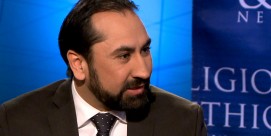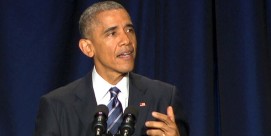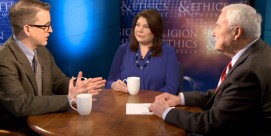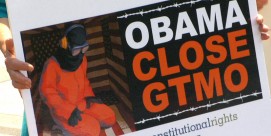David Lose: Obama’s Challenge and Opportunity
The religion of a political candidate should not matter. This principle is not only supported by the doctrine of the separation of church and state articulated by the First Amendment and developed by Jefferson and Madison, it is also supported by the dominant traditions of the Christian church. From St. Augustine to Martin Luther, theologians have argued that God works through political and other civic institutions to care for creation, as well as through the church to convey eternal salvation. Because political leaders are responsible for promoting a more orderly and just world, rather than preaching or teaching the faith, their own religious beliefs — or lack thereof — are irrelevant. The standard by which they are to be judged is fidelity, not to any particular creed but to the responsible discharge of their civil duties.
The religion of a political candidate shouldn’t matter…but it does. Many Americans associate religious faith with “character,” and because most of us tend to trust those who agree with us more than those who don’t, we have persistently preferred candidates whose faith is similar to our own. In years past, this has usually reflected the dominant cultural and religious ethos in two ways: candidates should profess belief in God in general and attend, or at least hold membership in, some recognized church.
Since the early 1980s and the welding together of conservative social stances and conservative religious traditions, the longstanding consensus about faith and politics has split. Conservative voters came to demand a higher standard of their candidates: a profession of personal faith in Jesus demonstrated by strict adherence to prescribed moral attitudes about abortion, gay rights, and a few other hotly contended issues. Liberals, meanwhile, wary of the new right-tilting religious and political amalgam, either distanced themselves from expressions of demonstrable religious piety or spent their energies resisting what they saw as the religious right’s incursion against the separation of church and state.
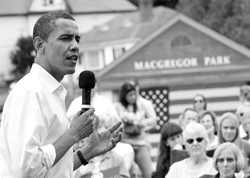 In the last five or six elections, this split has decidedly favored conservatives. It is not that Americans have become more religious — poll after poll indicates that about the same number of people profess faith in God as did in decades past (even as more people report belief that there is no God). Rather, it is that conservative religious leaders have offered their congregants a sharply defined religious identity grounded in political convictions, thereby forging an effective and powerful voting bloc. Noting their error, Democrats in the 2004 formed their own “faith-based” groups (recall “People of Faith for Kerry,” for instance) and made far more allusions to their faith than they had four years earlier.
In the last five or six elections, this split has decidedly favored conservatives. It is not that Americans have become more religious — poll after poll indicates that about the same number of people profess faith in God as did in decades past (even as more people report belief that there is no God). Rather, it is that conservative religious leaders have offered their congregants a sharply defined religious identity grounded in political convictions, thereby forging an effective and powerful voting bloc. Noting their error, Democrats in the 2004 formed their own “faith-based” groups (recall “People of Faith for Kerry,” for instance) and made far more allusions to their faith than they had four years earlier.
The recent and highly publicized political forum at Saddleback Church illustrates this continuing trend, as the presumptive candidates of both parties were willing, even eager, to answer questions about faith and values by mega-pastor and bestselling author Rick Warren. But the forum also indicated something else: the evangelical consensus so dominant in recent elections is less cohesive than even four years ago. While still professing the need for a “born-again” experience and paying allegiance to their traditional moral stances, conservative evangelicals like Warren have also developed a greater concern for the environment, the poor, and other societal issues.
For this reason, Democratic strategists rightly note an opportunity for Obama to attract evangelical voters in numbers closer to those of Bill Clinton than John Kerry. To accomplish this, Obama will need to demonstrate to evangelicals the genuineness and depth of his religious commitment in the hope that they might trust him as a candidate despite marked differences on some social issues.
The great irony in all of this, of course, is that Obama is the most self-consciously and transparently Christian candidate to have a serious chance at the presidency since Jimmy Carter, easily eclipsing the major Republican figures of the last three decades. Ronald Reagan, darling of the religious right though he was, did not regularly attend church before, during, or after his presidency. The elder Bush was a quiet, if not lukewarm, Episcopalian, never fully trusted by the right, while his son, though crediting a turned-around life to God, could not articulate how his faith affects his policy decisions if his life depended on it. And John McCain’s testimony to his faith has been limited to generalities about its role in helping him survive as a P.O.W.
In contrast, Obama describes his journey from agnosticism to the Christian faith and traces easily the influence of his faith on his various political stances. He was nurtured by and remains active in a local congregation. His much greater challenge, therefore, will be to invite evangelicals to consider the possibility that agreement on matters of faith neither guarantees nor requires agreement on policy decisions. Whereas Obama’s own faith tradition allows for this possibility, the recent formula whereby orthodoxy of theology is determined by the correctness of one’s position on social stances (a peculiar reinvention of justification by works) makes the task difficult.
But it wasn’t always that way. During the debates over the abolition of slavery and women’s suffrage, to name only two prominent examples, self-described evangelicals could be found right, left, and center on all the prominent social debates in our country over the last two centuries. A new generation of evangelicals seems open to reclaiming this element of their heritage, acknowledging the deep ambiguities of life in this world and willing to embrace a unity of belief and purpose amid debates about policy.
If Obama can tap into this side of evangelical Christianity, making a space for evangelicals to join with Roman Catholics and Protestants as well as those from other religious traditions to join in addressing the critical challenges of the day, he will not only garner more votes but also help revitalize evangelicalism itself.
A candidate’s faith shouldn’t matter, but it does. With his address from Denver tonight, Obama’s faith and character will be on national display for the next seventy days. More articulate by far than any recent candidate about his faith, he stands in a unique place not only to win this election but also to unite disparate strands of American Christianity to follow Jesus’ command to care “for the least of these.” It’s a tall order, to be sure, but if any candidate can do it, Barack Obama can. Yes he can.
–David Lose is the Marbury Anderson Associate Professor of Biblical Preaching and director of the Center for Faith & Life at Luther Seminary in St. Paul, Minnesota.


